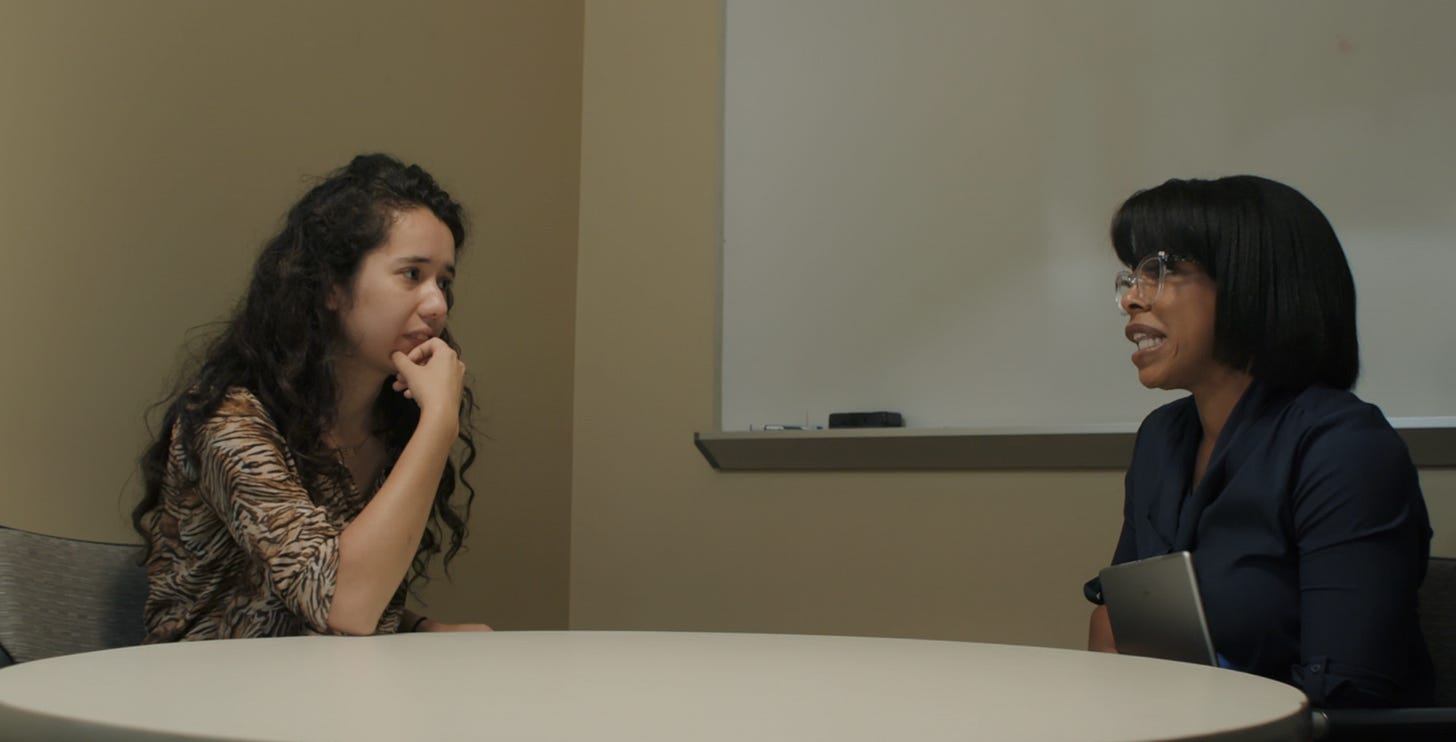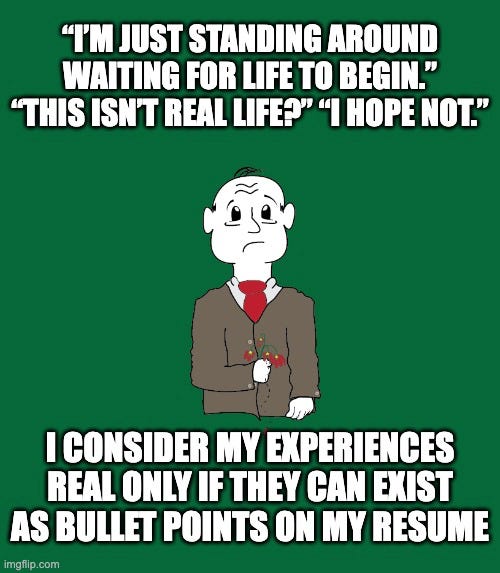Slacker Fest: Actual People
The inner slacker revolts against college’s false promises
Welcome to Slacker Fest, where we document our research and analysis of mass media’s “slacker” archetype, part of our effort to broaden the genre with a slacker film of our own. Find our master list of entries here. Previous entry: The Big Lebowski
(PROGRAMMING NOTE: Big Quit Energy is on hiatus from regular essays on work culture and workaholism until the end of November. Until then, enjoy our backlog of Slacker film analysis and “Friends With BQE” podcasts episodes!)
I was on the fence about including this film, as I’m not sure that Kit Zauhar—the filmmaker—intended it for the genre. She was kind enough to respond to my doubt by saying she didn’t mind the “slacker film” label, which to me says she personally didn’t conceive of it as one.
But the best art takes on its own meaning inside the audience’s mind, and Actual People took hold in mine as a viscerally relatable story of the malaise that occurs when our inner slacker, sick of being denied, takes over by force. This often happens in times of uncertainty—in the film’s case, the last weeks of school, when we can no longer ignore the work-humping world barreling toward us.
If Actual People counts as a slacker film, then it has the distinction of being the furthest I’ve seen the genre dip its toe into character drama. Let’s get into it! (As this is a relatively new film, consider this your SPOILER WARNING)
The basics
Release year: 2021
Premise: A young woman spends her final week of college dealing with anxiety about her future by clinging to whatever she can, most notably a boy from her hometown
Auteur: Kit Zauhar—the only female auteur I’ve found so far in the genre—in her directorial debut
Notable characters:
Riley — our slacker
Leo — her crush from home
David — her ex
Anderson — the roommate she sometimes sleeps with, who know wants her out of the apartment
Angela and Charlie — her parents
Valerie — her younger sister and budding wild child
Michaela, Paula, Jessica — her buds
Benji — Another bud who’s pretty transparently in love with her the whole movie, but who she turns down at the end, a possible sign of growth
Meet the slacker: Riley
There’s every reason to believe that Riley’s dutiful, conscientious, and loves stability in all aspects of her life. We happen to catch her, however, during a burnout response to extreme change and uncertainty as she’s shoved into the unstructured adult world. Oh, and she’s also grieving a breakup that she didn’t see coming.
Accordingly, we see her forget to write papers, fail a class, put off finding work, and passively accept that she’ll move back home after school. Emotionally, she drifts from fling to fling, grasping for stability in other people, but constantly rejected there as well.
Her world: American college when it stops caring about you
When, like Riley, I was flailing for stability and plunging into depression as graduation neared, I turned to my school community for reassurance, only to confirm there was no community there. There had only been a feeling induced by the marketing team (one they still try to stoke during fundraising season), a mirage that dissipated once the last tuition check cleared and the school washed its hands of us faster than we could drag our baggage off campus.
This mismatch between colleges’ promise of meaningful community and their actual commitment to it isn’t unique to my school, and I’ve never seen it explored it more beautifully than in Riley’s scene with a college-provided therapist. Just when she thinks she’s close to understanding her anxieties, the therapist informs her that they can’t continue the process—not even as a meager text to check in. But “good luck with graduation!” Nothing screams senior year quite like your school severing ties with you when you feel least prepared for the future they sold you.
Riley’s therapist may genuinely want to help her—is the strain on her face frustration at their predicament?—but if she has cared in the past, she’s probably been scolded for it. I imagine interactions are similar any time a worker brings problems to HR (I can’t say I have…I don’t see the point). Ironically, this is the one way Riley’s school is preparing her for the future, giving her a taste of capitalism’s unwillingness to make space for emotional labor if it interferes with business.
What does our slacker want and what’s in the way?
Riley wants what many slackers we’ve studied have learned to do without: stability and a sense of direction. In opposition is a part of her that perhaps wants to be freed from the pressure of achieving them, that knows these desires are elusive social constructs which we only ever get to “have” in fleeting moments, if at all.
How does the film define a “slacker” in broader terms?
Anyone who hasn’t figured out a rock-solid sense of where their life is going. Or, if you pardon my corniness, any actual person with doubts that make them flail about. This film is a reminder that everyone, even the biggest workhumpers, have episodes where their bodies and psyches go on strike. If you haven’t learned to accept and embrace these episodes (and most of us have not), they can be terrifying.
Indecisiveness is a telltale sign of this. Actual People does a nice job of showing the pain those who constantly change their mind cause themselves and others, given that we live in a culture that doesn’t know how to handle (and often punishes) changes in course. Riley is both “victim” and “perpetrator” in this regard—she unsettles her family with her indecisiveness, while she’s also deeply hurt by her ex’s change of heart regarding her (“how does someone just stop loving you?”).
Could anyone other than a White dude an Asian-American woman pull off slacking in this story world?
Zauhar doesn’t make it explicit, but anyone could (arguably, everyone must) go through what Riley’s going through.
This is a rare slacker film in that it offers a non-derisive portrayal of a female slacker, one done in the “Dante” mold of someone who wrestles with guilt over their slacking. The few women protagonists in the genre are portrayed like this, maybe because filmmakers find it’s the only “honest” way to portray them. Given how intensely women in our society are socialized to stamp out any impulses to goof off, a female slacker who didn’t feel at least some guilt would have superhuman self-assurance.
As far as ethnicity, Zauhar specifically said she didn’t want to focus on Riley’s Asian-American heritage. However, we do get to meet her parents through a bit of a “misdirect” scene, where at first they confront her in the authoritarian style we’ve been conditioned to expect from an Asian mom, but become nurturing when Riley has a breakdown and verbalizes what she’s going through. This is a nice, tender bit of nuance I wouldn’t expect from Harold and Kumar.
Does the film “approve” of slacking? Is it a broader antiwork statement?
If Actual People doesn’t view slacking episodes “negatively,” at the very least it shows the suffering that occurs when someone isn’t ready to embrace them. In a sense, the “purpose” of the slacker genre, if it has any, could be to help us lose our fear of these highly uncertain experiences, helping us dream up alternate ways to be with the uncertainty.
Watching Actual People (which, it bears repeating, wasn’t explicitly intended as a slacker film) I found myself feeling weirdly nostalgic for what COULD have happened if I had flowed into my own post-college life with less anxiety. Intentionally or not, it serves as a painful reminder that most of us are understandably incapable of resisting the pressures of culture and don’t give ourselves a chance to discover the gifts that “directionless” passages of life can offer.
What does the film see as the broader “enemy?”
Zauhar does a great job of not being heavy-handed with her agenda or grievances.
I came away with a renewed sense of anger toward the collegiate marketing machinery that uses gullible teenager’s dreams and fears to dupe them into making expensive decisions. But that’s my own baggage talking.
Walt Wiltman’s favorite line
Sabrina Cardone’s take
“Riley, I don’t know why you’re so freaked out. I wish I could be your age and get to work. I CAN’T WAIT to work! I’m happiest when I’m flooded with work. Aren’t you? I can’t believe you already wasted four years at college just sitting there thinking, and even NOW you don’t wanna to start? As crazy as you are for spending $100k on an art degree, you may want to spend a couple thousand more to have my dad inspire you into being normal.”
Are there any slacker-like innovations in the technique of the film itself?
Plot / Setting
Like much of the genre, Actual People utilizes a loose vignette plot that, while linear, doesn’t have hard cause-and-effect mechanisms. Time also fast forwards in leaps between scenes, a nice “efficient” way to tell stories that trusts the audience to piece things together.
Cinematography / Camera use / Color / Mise-en-scéne
I appreciate the unworried use of focus, letting people come in and out of blurriness. It feels free-flowing and slacker in spirit, aside from presumably allowing shoots to rely less on highly choreographed blocking and lighting.
(Related: I liked the use of rack focus to “cut” between speakers instead of classic over-the-shoulder setups. This allows for longer, more natural-feeling takes.)
Editing / Pacing
Sound / Music
What would I want to keep for our slacker film? What do I want to leave or push?
KEEP
Actual People is a good recent case study for tactics that achieve quality look an feel without many resources. A lot of shots seem to use available light artfully, even at night. I also appreciate how composition makes sparsely dressed sets look interesting:
I also love the idea of serving jungle juice from the bathtub. Not for our movie, just for the next time I host company.
LEAVE / PUSH
As much as I love Zauhar’s rack focus “cuts” between speakers, it’s an example of something that may not be feasible if our film is micro-budget and uses even smaller crews (say, if I shoot it solo, Noam Kroll style). It’s simply too much for one person to watch the acting, keeping things in frame, AND work the camera’s focus.
More importantly, as much as I understand why female slackers tend to come in the self-loathing “Dante” mold, I really want to try depicting one in the unapologetic, I-don’t-give-a-shit-what-you-think, Cheech and Chong/Randall mold.
The most memorable art often brushes up against viewers’ wounds. I have no clue about Zauhar’s intentions, but Actual People clearly brushed up against some of mine, wounds that also drive this blog. I feel comfort in knowing that I’m not the only one.
Next entry: Funny Ha Ha







